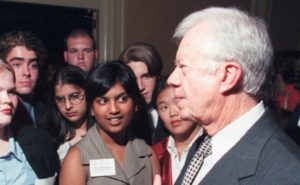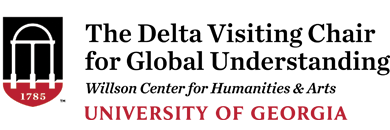Jimmy and Rosalynn Carter and The Carter Center – 1999 Delta Prize Recipient
In the 1940s a wildlife ecologist named Aldo Leopold published an essay titled “The Land Ethic,” in which he argued that all ethics rest upon the premise that “the individual is a member of a community of interdependent parts.” Instincts prompt the individual to compete for a place in the community, but ethics prompt the individual also to cooperate with other community members. Leopold viewed the history of Western ethics as a continuous expansion of our ethical community: from our family to our tribe to our nation. Eventually, he said, our ethical community would include the land, and we would treat the land, on which we depend for our survival, with respect.
published an essay titled “The Land Ethic,” in which he argued that all ethics rest upon the premise that “the individual is a member of a community of interdependent parts.” Instincts prompt the individual to compete for a place in the community, but ethics prompt the individual also to cooperate with other community members. Leopold viewed the history of Western ethics as a continuous expansion of our ethical community: from our family to our tribe to our nation. Eventually, he said, our ethical community would include the land, and we would treat the land, on which we depend for our survival, with respect.
Leopold’s principle that interdependence makes cooperation necessary is applicable to our new global society. Transnational systems of transportation, communication, commerce, and finance are connecting us all with one another. Our ethical community is no longer our tribe, or even our nation; it is the world. We have become a global community of interdependent parts, and the well-being of any one of the parts requires cooperation with the others.
The advantages of cooperation over military competition have become obvious to many. Individuals from cultures ethnically distinct and geographically remote from each other are joining together to work for the improvement of our planetary environment, the alleviation of suffering from famine and disease, and the advancement of human rights and democratic principles. Individuals are working unofficially, in non-governmental organizations all over the world, to help bring about greater social justice, more peaceful interaction, and increased intercultural understanding.
However, although globalization brings the necessity for cooperation, it also brings conflict, as people with religious, ethnic, economic, territorial, and political differences fight to preserve long-standing traditions and values. Intercultural understanding in our expanded ethical community is a challenge to achieve.
In 1995, when the two of us were talking about ways the University of Georgia could promote intercultural understanding, Gary suggested that the Center for International Trade and Security and the Center for Humanities and Arts develop an international award to recognize successful efforts to make a more harmonious global society. With the support of President Charles B. Knapp, we proposed to Michael Young, director of the Delta Air Lines Foundation, that the University of Georgia and Delta Air Lines collaborate in the creation of a “Delta Prize for Global Understanding.” Mr. Young liked the idea and persuaded Delta Air Lines to endow the prize, which the Center for International Trade and Security and the Center for Humanities and Arts would jointly administer.
The Delta Prize is unique among international awards in its involvement of students in the selection process. A student selection committee, composed of University of Georgia Foundation Fellows and two additional international students, under the guidance of Kathleen Harris, associate director of the Foundation Fellows Program, solicited nominations from organizations around the world, investigated the background and accomplishments of each nominee, and prepared a short list of eight candidates, with dossiers, for the Delta Prize Selection Board. On August 28, 1998, at a meeting in Delta’s Corporate Headquarters in Atlanta, the Selection Board chose as the recipients of the inaugural Delta Prize President and Mrs. Jimmy Carter and The Carter Center.
The Delta Prize was thus established to call attention to individuals or groups who by their own initiative have provided opportunities for greater understanding among cultures and nations. In the late 1970s, few individuals comprehended the ethical implications of globalization. But President Carter was one of those few. With his inspired concept of “human rights,” which encountered much resistance at the time, President Carter showed us our responsibility to be good citizens of a global ethical community. He was by far a man before his time. In the years since his presidency, by founding The Carter Center and by working tirelessly on behalf of a healthier and more peaceful, just, and prosperous global ethical community, he and Mrs. Carter have exemplified the ideals the Delta Prize for Global Understanding was designed to honor. By improving intercultural understanding in many regions of the world where conflict once ruled, President and Mrs. Carter and The Carter Center have demonstrated that understanding makes cooperation possible and that cooperation makes peace.
On April 27, 1999, at a banquet at the Ritz-Carlton, Buckhead, in Atlanta, Georgia, President and Mrs. Carter accepted the first Delta Prize for Global Understanding. In his speech, President Carter spoke of the United States’s compelling need to “wage peace.” We are pleased to include the speech and related information in this inaugural volume of the Delta Prize for Global Understanding series.
